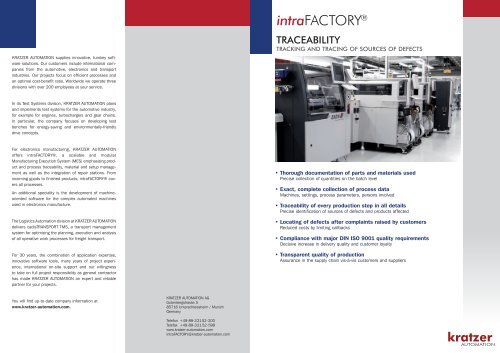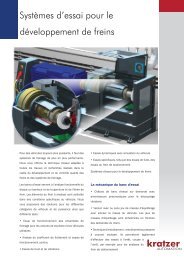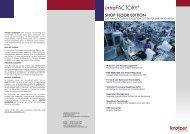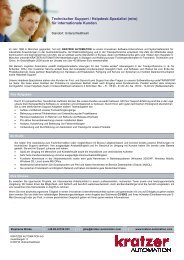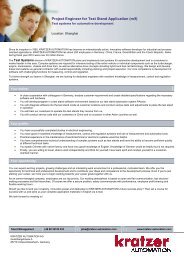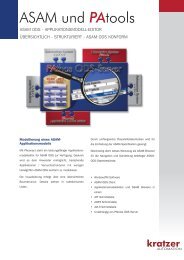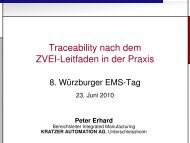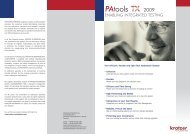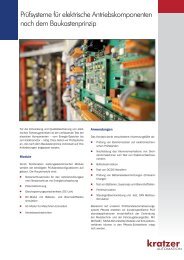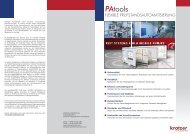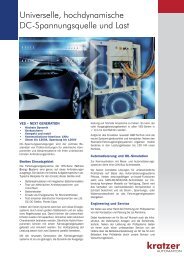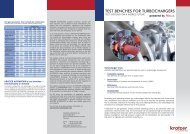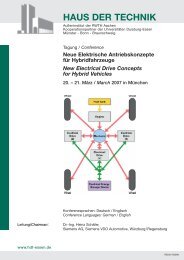intraFACTORY® - Kratzer Automation
intraFACTORY® - Kratzer Automation
intraFACTORY® - Kratzer Automation
Create successful ePaper yourself
Turn your PDF publications into a flip-book with our unique Google optimized e-Paper software.
KRATZER AUTOMATION supplies innovative, turnkey software<br />
solutions. Our customers include international companies<br />
from the automotive, electronics and transport<br />
industries. Our projects focus on efficient processes and<br />
an optimal cost-benefit ratio. Worldwide we operate three<br />
divisions with over 200 employees at your service.<br />
In its Test Systems division, KRATZER AUTOMATION plans<br />
and implements test systems for the automotive industry,<br />
for example for engines, turbochargers and gear chains.<br />
In particular, the company focuses on developing test<br />
benches for energy-saving and environmentally-friendly<br />
drive concepts.<br />
For electronics manufacturing, KRATZER AUTOMATION<br />
offers <strong>intraFACTORY®</strong>, a scalable and modular<br />
Manufacturing Execution System (MES) emphasizing product<br />
and process traceability, material and setup management<br />
as well as the integration of repair stations. From<br />
incoming goods to finished products, <strong>intraFACTORY®</strong> covers<br />
all processes.<br />
An additional speciality is the development of machineoriented<br />
software for the complex automated machines<br />
used in electronics manufacture.<br />
The Logistics <strong>Automation</strong> division at KRATZER AUTOMATION<br />
delivers cadisTRANSPORT TMS, a transport management<br />
system for optimizing the planning, execution and analysis<br />
of all operative work processes for freight transport.<br />
For 30 years, the combination of application expertise,<br />
innovative software tools, many years of project experience,<br />
international on-site support and our willingness<br />
to take on full project responsibility as general contractor<br />
has made KRATZER AUTOMATION an expert and reliable<br />
partner for your projects.<br />
You will find up-to-date company information at<br />
www.kratzer-automation.com.<br />
KRATZER AUTOMATION AG<br />
Gutenbergstrasse 5<br />
85716 Unterschleissheim / Munich<br />
Germany<br />
Telefon +49-89-32152-200<br />
Telefax +49-89-321 52-599<br />
www.kratzer-automation.com<br />
intraFACTORY@kratzer-automation.com<br />
intraFACTORY ®<br />
TraceabiliTy<br />
TracKiNG aND TraciNG OF SOUrceS OF DeFecTS<br />
• Thorough documentation of parts and materials used<br />
Precise collection of quantities on the batch level<br />
• Exact, complete collection of process data<br />
Machines, settings, process parameters, persons involved<br />
• Traceability of every production step in all details<br />
Precise identification of sources of defects and products affected<br />
• Locating of defects after complaints raised by customers<br />
Reduced costs by limiting callbacks<br />
• Compliance with major DIN ISO 9001 quality requirements<br />
Decisive increase in delivery quality and customer loyalty<br />
• Transparent quality of production<br />
Assurance in the supply chain vis-à-vis customers and suppliers
intraFACTORY ® TraceabiliTy<br />
Even when operating to the highest quality standards it is not always<br />
possible to avoid manufacturing defects entirely. When they<br />
are detected, they have frequently arisen in upstream stages of<br />
the manufacturing process and have already spread “like a virus”<br />
through all downstream production levels and to shipped products.<br />
Uncertainty about the possible extent of a manufacturing<br />
defect explains why so many products are affected in the event<br />
of callbacks.<br />
The solution<br />
When complaints are raised, however, it is possible to pinpoint<br />
the affected products if production keeps full documentation of<br />
components and consumables as well as of every processing<br />
step. In these cases, this data can be used to trace sources of<br />
defects, identify defects clearly and assess their impact.<br />
Traceability is a central function of the intraFACTORY manufacturing<br />
execution system. Its fast stepClient process interfaces ensure<br />
that all production data can be collected without delay even<br />
at extremely high rates.<br />
The prerequisite for complete traceability is the ability to identify<br />
all parts and materials at any time using firmly installed or mobile<br />
scanners (barcode, RFID, microchips).<br />
Tracking and tracing on batch level<br />
To narrow down tracing effort, components and materials that<br />
cannot be identified directly (for instance firms, bulk material)<br />
have to be separated in their batches. intraFACTORY extends the<br />
master data for components into self-interpreting trace numbers<br />
with details of the batch, expiration date, inspection results and<br />
quantity in the batch (see the example at the bottom right).<br />
It is essential to trace material on batch level because manufacturers‘<br />
codings may be mixed in the batches. And with post-setup<br />
activities, too, batches may mix, giving rise to uncertainties that<br />
the intraFACTORY Material Manager allows for by transitionally<br />
posting both the old and the new batch.<br />
Greater process reliability<br />
In addition to pinpointing the impact of manufacturing defects,<br />
the traceability facility provides you with maximum transparency<br />
about corporate processes, the potential to improve them and<br />
the ability to increase process reliability by reducing the risk of<br />
manufacturing defects.<br />
Expansion to full-scale MES functionality<br />
intraFACTORY Traceability is a module of the intraFACTORY Shop<br />
Floor Edition. By using other standard modules – such as Material<br />
manager, Process locking (Advanced Process Control APC),<br />
Order tracking with online reporting amd Repair Manager – you<br />
can establish a custom manufacturing execution system (MES,)<br />
step by step, that extends as far as goods-in and shipping.<br />
DEFECT<br />
bacKWarD TracKiNG FOrWarD TracKiNG<br />
Find defect<br />
causing process<br />
Remove<br />
defect<br />
Block effected<br />
batches<br />
Find source<br />
of defect<br />
Block affected<br />
components<br />
Inform affected<br />
customers<br />
Targeted<br />
remedy<br />
The „W“ questions of tracking and tracing<br />
Forward tracking entails finding the potential impact of defects<br />
on products that have already been completed, whereas<br />
backward tracking makes a distinction between product and<br />
process traceability.<br />
Product traceability<br />
What component has been fitted<br />
into which product<br />
under which batch number and when,<br />
as part of which order lot,<br />
using what material,<br />
and for which customer ?<br />
Process traceability<br />
How was the product made,<br />
on which line<br />
and in which production step,<br />
under what conditions,<br />
using what resources,<br />
by which employees<br />
and what were the results ?


